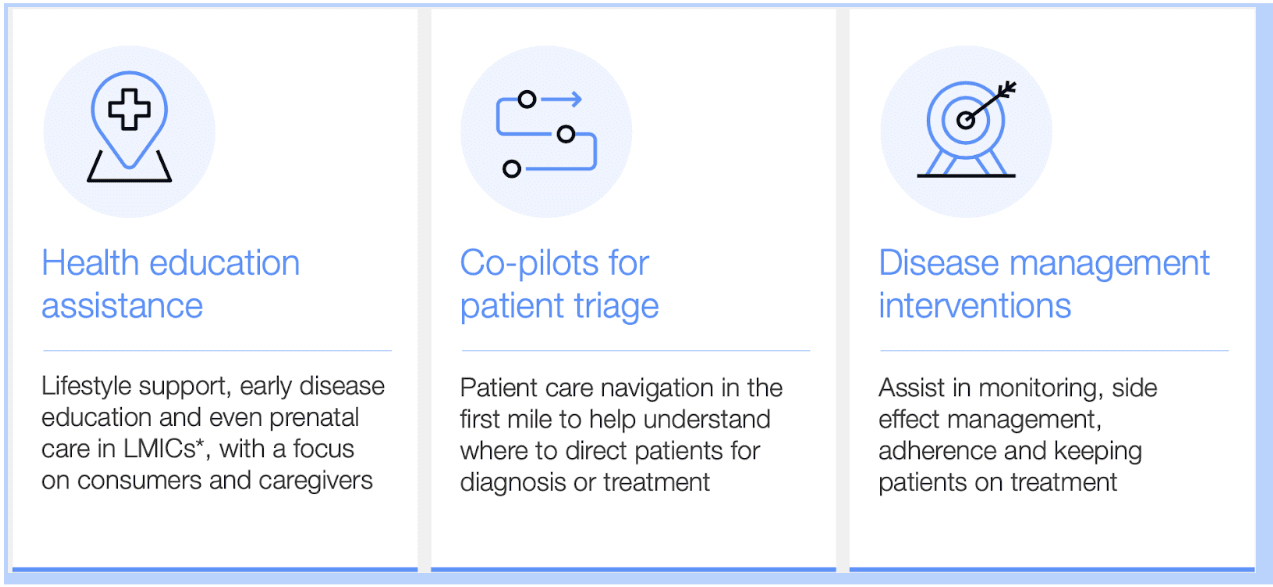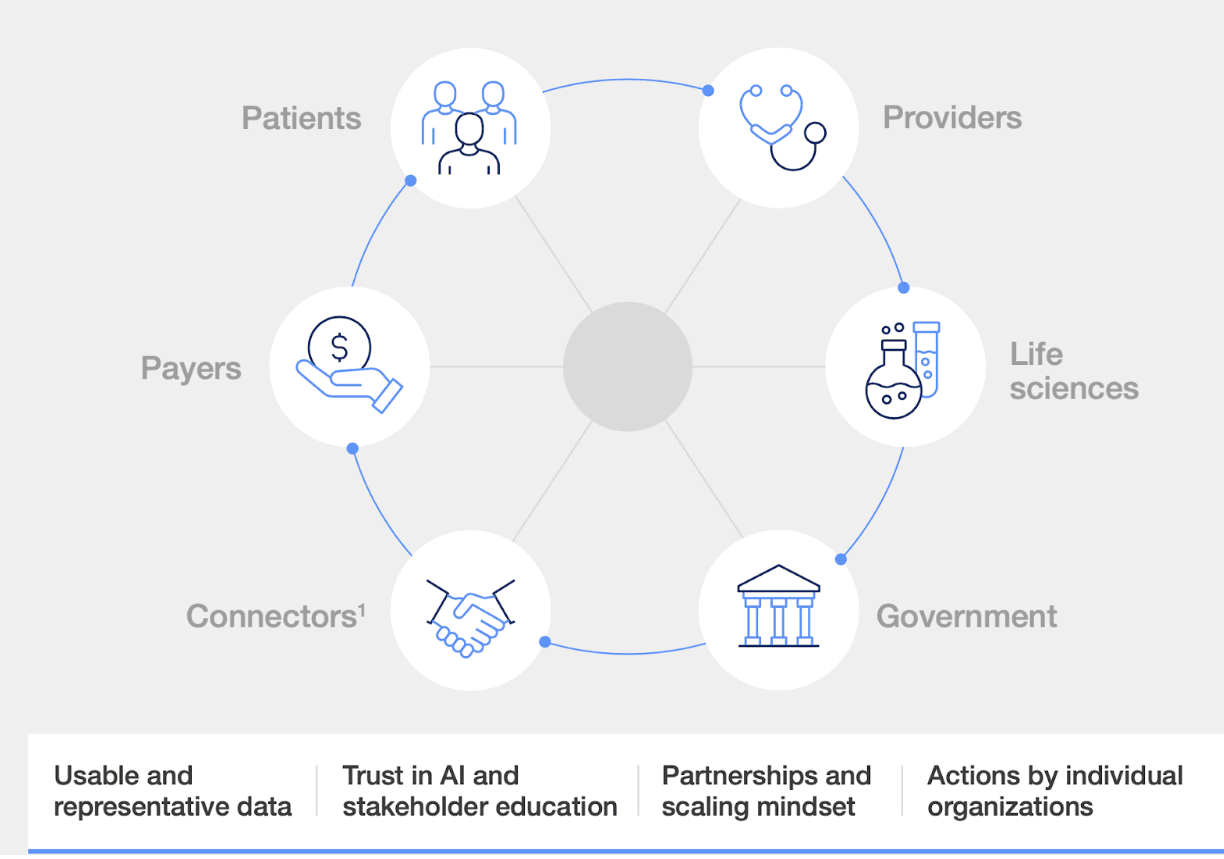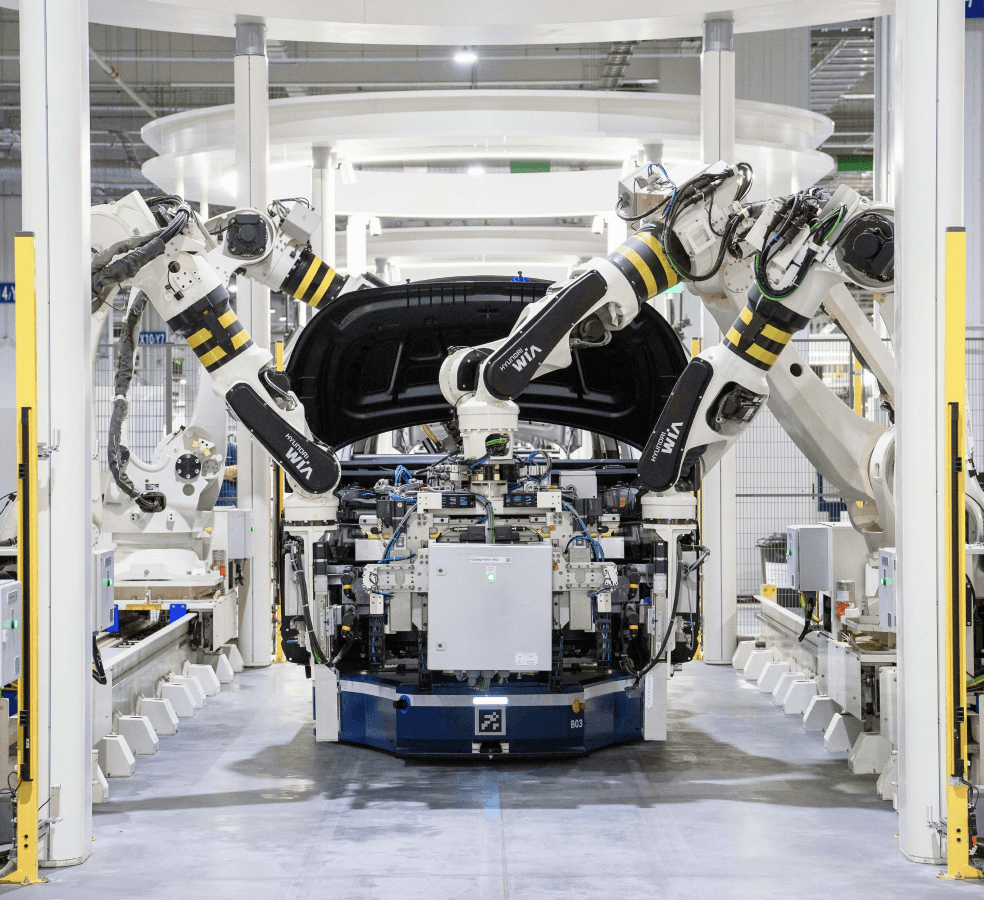Generative AI emerges as a groundbreaking solution to global healthcare dilemmas, though it's not a cure-all. The COVID-19 pandemic has magnified critical challenges within the healthcare sector, notably a drastic shortage of healthcare workers, escalating health disparities, and financial pressures on health systems worldwide. Despite the projected decrease, a significant gap in the healthcare workforce, predominantly in low- and middle-income countries, jeopardizes global health by hindering access to necessary and preventive healthcare services. In this landscape, generative AI shines as a promising tool, not just overcoming the limitations of predictive AI but also propelling healthcare towards consumer-centric transformation. This shift, accelerated by the pandemic, demands a more accessible and engaging healthcare experience from patients globally.
Generative AI: A Beacon of Hope Amidst Healthcare Challenges
The introduction of generative AI into healthcare marks a pivotal shift in addressing longstanding obstacles. While not a silver bullet, it offers a novel approach to tackling complex issues that traditional predictive AI models struggle with. Its role is particularly crucial in bridging the alarming global healthcare worker shortage, which severely impacts patient care and preventive health services availability, especially in underprivileged regions.
Transforming Patient Engagement Through Generative AI
Generative AI's potential extends beyond mere data analysis to enhancing direct patient engagement. This approach is vital for alleviating healthcare system burdens, reducing healthcare provider burnout, and significantly improving patient experiences and outcomes. The ongoing consumerization of health, driven by an increased demand for transparency and convenience in healthcare services, underscores the importance of generative AI in meeting evolving patient expectations.
Navigating the Roadblocks to Generative AI Adoption in Healthcare
Despite its immense promise, the journey towards widespread generative AI adoption in healthcare is fraught with challenges. Key among these are the skepticism from healthcare professionals and the public, data inadequacies, and the struggle for scalability in resource-constrained settings. Overcoming these hurdles is essential for harnessing generative AI's full potential in healthcare.
Key Takeaways for the Future of Healthcare with Generative AI Generative AI holds transformative power for healthcare consumers throughout their health journey, offering tailored health information, facilitating appropriate care levels, and aiding in condition management. The path to realizing this vision involves enhancing AI models with empathy and specialized knowledge, addressing biases by integrating diverse data sources, and developing economical training methods. Encouraging the adoption of generative AI in healthcare will require continuous efforts to refine these technologies, ensuring they are inclusive, efficient, and capable of delivering on their promise to revolutionize patient care.
In essence, generative AI stands as a significant innovator in the healthcare field, promising to reshape how care is delivered and experienced. However, realizing its full potential necessitates a concerted effort to overcome existing barriers, underscoring the need for a collaborative approach to healthcare innovation.
In an era where healthcare challenges are becoming increasingly complex and multifaceted, the emergence of generative AI as a tool to enhance patient engagement and support healthcare systems is both timely and revolutionary. The integration of this technology into healthcare is poised to transform the way patients access health information, receive care, and manage their conditions, fundamentally altering the patient care experience. This article delves into the broad categories of generative AI applications in healthcare, illustrating its potential to empower patients and alleviate the burden on health systems, while also highlighting real-world applications and the impact on disease management interventions.
Generative AI: A New Frontier in Patient Engagement
The application of generative AI in healthcare is diverse, targeting critical areas such as health education, patient triage, and disease management. This technology is not just about automating processes; it's about creating more personal, engaging, and efficient healthcare experiences for patients. With the global healthcare worker shortage exacerbated by the COVID-19 pandemic, generative AI offers a beacon of hope, promising to bridge gaps in healthcare provision and patient engagement.
Empowering Patients with Health Education
One of the most profound impacts of generative AI is in health education. Traditional methods of patient education are often limited by accessibility, language barriers, and the quality of information. Generative AI, however, can deliver personalized, high-quality health information across languages and regions, making it a powerful tool for improving health literacy globally. For instance, Ada Health's digital symptom checker exemplifies how generative AI can provide reliable, accessible health information, significantly impacting patient outcomes and literacy.
Revolutionizing Patient Triage with AI
The healthcare provider shortage is a global crisis that generative AI can address by enhancing patient triage. Early solutions like chatbots have shown promise but lacked the scalability and nuance needed for widespread adoption. Generative AI, with its ability to learn and adapt to diverse cultural contexts and healthcare ecosystems, offers a more sophisticated solution. By automating patient intake and guiding patients through the initial stages of care, technologies like K Health, in partnership with Cedars-Sinai, demonstrate how generative AI can streamline healthcare delivery and improve patient experiences.
Innovating Disease Management Interventions
Generative AI's role extends into disease management, where it can significantly enhance the effectiveness of interventions. Traditional methods often fail to maintain patient adherence to treatment plans, but generative AI can create personalized interventions that encourage patients to stay on course. For example, Mayo Clinic's use of a patient's genetic profile to predict treatment effectiveness showcases how generative AI can tailor care to individual needs, thereby improving outcomes for chronic conditions like rheumatoid arthritis.
 Figure 1: Use of a patient's genetic profile
Figure 1: Use of a patient's genetic profile
Real-World Vignettes: Generative AI in Action
- Ada Health: Ada's generative AI-powered symptom checker offers a glimpse into the future of self-care, providing accurate health assessments and improving disease recognition.
- K Health and Cedars-Sinai: This partnership illustrates how generative AI can revolutionize patient intake and triage, offering 24/7 access to healthcare professionals and personalized care.
- University of Rochester Medical Center: URMC's use of generative AI for message triage demonstrates the potential to improve communication efficiency and reduce administrative burdens on healthcare providers.
- Mayo Clinic: By predicting treatment effectiveness based on genetic profiles, Mayo Clinic leverages generative AI to advance personalized medicine and improve patient outcomes.
- Partnerships like Amazon and Hurone AI: These collaborations highlight the global impact of generative AI, offering innovative solutions for cancer care in resource-limited settings.
The Road Ahead: Embracing Generative AI in Healthcare
The integration of generative AI into healthcare is not without its challenges, including issues of trust, data privacy, and the need for continuous model improvement. However, the potential benefits of this technology in enhancing patient engagement, improving health outcomes, and alleviating system burdens are undeniable. As healthcare systems continue to evolve, the adoption of generative AI will play a crucial role in shaping a more responsive, efficient, and patient-centered healthcare landscape.
Overcoming the Barriers to Generative AI in Healthcare: Navigating Trust, Data Integrity, and Global Equity
Generative AI holds transformative potential for patient care, offering innovative ways to enhance health education, streamline patient triage, and personalize disease management. However, its widespread adoption faces significant barriers. Key challenges such as mistrust in AI outputs, data foundation gaps, and scalability issues, especially in low- and middle-income countries (LMICs), hinder the technology's potential to deliver safe and effective patient-facing applications. This article explores these barriers and outlines strategies to overcome them, ensuring generative AI can fulfill its promise in revolutionizing healthcare across the globe.
Trust: The Cornerstone of Generative AI Adoption
Trust emerges as the paramount barrier to the adoption of generative AI in healthcare. The fear of inaccuracy stands tall among concerns, with AI occasionally producing misleading answers due to data insufficiencies. This "hallucination" risk underscores the necessity for AI to augment rather than replace human clinical decision-making. Innovations like those from Perplexity AI, which aim to increase trust through transparency about how models derive their outputs, are critical. These efforts are vital in helping users discern the reliability of AI-generated information.
Addressing the Data Foundation
A robust data foundation is essential for generative AI's success in healthcare. Issues of inaccuracy and bias in AI outputs predominantly arise from insufficient or skewed training data. The industry must prioritize building comprehensive data management infrastructures and employing strategies like federated learning to enhance data robustness. Moreover, tackling the challenge of biased outputs requires rigorous governance and transparency throughout AI models' life cycles. Initiatives to generate "synthetic data" by companies like Johnson & Johnson and Syntegra represent innovative approaches to using AI while safeguarding patient privacy and data integrity.
Scalability: Ensuring Global Equity
The promise of generative AI in healthcare risks being overshadowed by scalability challenges, particularly in LMICs. Key issues include the scarcity of quality training data in various languages and the high computational resources required for running AI models. These challenges are compounded by the need for substantial cloud computing services to deploy and scale AI applications, posing significant obstacles for resource-limited settings. To mitigate these issues, fostering multilateral, cross-border partnerships is crucial for leveraging generative AI's benefits globally. Ensuring that AI models are adaptable to diverse languages and contexts through context-specific prompt engineering is essential for achieving safe and reliable outputs worldwide.
Bridging the Gaps: Strategies for the Future
The journey to overcoming these barriers involves several strategic approaches:
- Augmenting Human Decision-Making: AI should complement, not replace, human clinical judgment, with an emphasis on enhancing the reliability and accuracy of AI outputs.
- Enhancing Data Integrity and Privacy: Strengthening data management infrastructures and embracing synthetic data can help address concerns around data accuracy and patient privacy.
- Advancing Transparency and Governance: Implementing robust governance frameworks and increasing transparency can mitigate biases and build trust in AI technologies.
- Promoting Global Collaboration: Building partnerships and sharing resources and expertise can accelerate the development and scaling of AI solutions, particularly in underserved regions.
- Tailoring AI to Diverse Contexts: Developing AI models that are adaptable to various languages and cultural contexts is key to ensuring equitable healthcare improvements worldwide.
 Figure 2: Strategic approaches to AI in healthcare
Figure 2: Strategic approaches to AI in healthcare
While generative AI has the potential to revolutionize healthcare, overcoming barriers related to trust, data integrity, and scalability is essential for its successful implementation. By addressing these challenges through strategic initiatives and global collaboration, we can unlock the full potential of generative AI to enhance patient care and achieve greater equity in healthcare access and outcomes. The journey ahead requires a concerted effort from technology developers, healthcare providers, and policymakers to ensure that generative AI serves as a force for good in healthcare, empowering patients and providers alike across the globe.
Unleashing Generative AI in Healthcare: A Roadmap for Stakeholder Collaboration and Action
The advent of generative AI technologies like ChatGPT has sparked widespread excitement and investment, promising to revolutionize patient care across the healthcare ecosystem. However, transitioning from initial enthusiasm to the practical, widespread adoption of patient-facing generative AI requires overcoming significant barriers. This endeavor demands concerted efforts from all stakeholders, including healthcare providers, payers, life sciences companies, governments, and more. Based on insights from the June 2023 Forum-ZS report, this article outlines a strategic action plan for harnessing generative AI's potential to improve patient health outcomes.
Ecosystem and Principles for Accelerating Generative AI
To navigate the challenges and leverage the opportunities presented by generative AI, stakeholders across the healthcare spectrum must engage in sustained collaboration. This involves connecting diverse players—from patients and providers to payers, life sciences entities, and governments—under a unified framework aimed at driving the ethical and effective implementation of generative AI solutions. Such an ecosystem encourages sharing knowledge, resources, and best practices, ensuring that the benefits of generative AI can be realized at scale and across diverse contexts.
A Four-Step Action Plan for Healthcare Stakeholders
1. Building Trust Through Empathy and Interactivity
Trust is fundamental to the successful deployment of generative AI in healthcare. Stakeholders must focus on refining AI models to exhibit empathy and improve interactivity. This involves leveraging healthcare-specific data to train models and allowing for dynamic interaction where users can question and evaluate AI outputs. Encouraging providers to engage with these models and provide feedback on responses can enhance their relevance and reliability, fostering greater patient trust and engagement.
2. Mitigating Bias in AI Outputs
Bias in AI outputs poses a significant challenge, especially given the disparate data sources within the healthcare system. To address this, stakeholders must work towards integrating these fragmented data layers, creating a comprehensive data ecosystem that enriches model training sets. Continuously monitoring and measuring response biases, particularly in underserved populations, is critical to identifying and mitigating potential disparities in AI-generated advice and information.
3. Keeping Humans in the Loop
Despite generative AI's advanced capabilities, it is imperative to recognize its limitations and potential for errors, such as generating misleading information ("hallucinations"). Education about these limitations for both patients and providers is essential. Furthermore, integrating patient-facing AI tools into existing clinical workflows, with robust processes for reviewing and overriding AI recommendations, ensures that human expertise remains at the forefront of patient care, particularly in complex or high-risk scenarios.
4. Planning for Scalable Deployment Across Contexts
The computational demands of running large-scale generative AI models are substantial, prompting a need for more energy-efficient technologies. Stakeholders, including technology companies, governments, and non-governmental connectors, must explore and implement scalable, flexible deployment strategies that account for regional, cultural, and contextual variations in healthcare needs and resources. Recognizing that a one-size-fits-all approach is impractical, tailoring AI solutions to specific environments will be key to their success.
The pathway to integrating generative AI into patient care is fraught with challenges, yet it offers unprecedented opportunities to enhance healthcare delivery, patient engagement, and outcomes. By adopting a collaborative, multi-stakeholder approach that emphasizes empathy, bias mitigation, human oversight, and scalable deployment, the healthcare ecosystem can unlock the full potential of generative AI. This journey requires a commitment to continuous learning, adaptation, and innovation, ensuring that generative AI serves as a powerful tool for advancing patient-first healthcare in the digital age.








